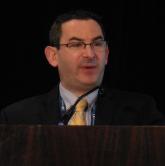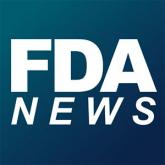Conference Coverage

Thousands expected to get CAR T-cells by 2018
Kite Pharma has a Los Angeles–area facility capable of processing T-cell specimens from 4,000 to 5,000 patients a year, according to Christine...

Chimeric antigen receptor (CAR) T-cell therapy has generated a great deal of excitement in recent months with the approval of Novartis’ Kymriah (tisagenlecleucel) for pediatric acute lymphoblastic leukemia and Kite Pharma’s Yescarta (axicabtagene ciloleucel) for relapsed/refractory large B-cell lymphoma in adults, and experts in the field foresee a wave of approvals for additional indications in the coming months.
“CAR T is coming unbelievably fast,” Richard Maziarz, MD, professor of medicine at Oregon Health and Science University, Portland, said in an interview.
In fact, a search of clinicaltrials.gov revealed 120 open CAR T-cell–based therapy trials for cancer and other conditions such as autoimmune diseases, he said.
During a plenary session on genetically modified cell therapies at the annual meeting of the Society for Immunotherapy of Cancer, experts and investigators provided a glimpse of what’s in store, including new targets and smarter targeting and combinations that incorporate CAR T-cell therapy to treat solid tumors.
Somewhat lost in the CAR T excitement, however, is the matter of access and affordability. Some estimates put the total cost of CAR T-cell therapy at up to $1.5 million per patient.The “list price” for tisagenlecleucel is $475,000, and the potential patient pool is in the hundreds. The price for axicabtagene ciloleucel is $373,000, with a potential market in the thousands. Taking this into account, the global CAR T market is estimated at about $72 million and is projected to expand to nearly $3.5 billion in the next decade, said Dr. Maziarz, who is also chair of the Value and Health Economics Interest Group of the American Society for Blood and Marrow Transplantation.
The market for adoptive cell therapy overall – including transplant, CAR T, natural killer cells, and cell vaccines – is projected by some individuals to be worth $30 billion by 2030, he added, noting, for the sake of comparison, that the total estimated U.S. expenditure for all cancer care in the United States in 2010 was $125 billion.
At the heart of the issue of cost is the matter of value, he said.
“You can talk about price, and you can talk about cost, but … what we want to do with our dollars is buy value – and quality and value are very hard to measure,” he said, noting that he expects public and governmental backlash, as was seen with prior high-cost treatments such as Sovaldi for hepatitis C and Glybera for lipoprotein lipase deficiency.
Value-based payment is a recurrent theme in medicine, and these treatments came under intense scrutiny for their high costs. Sovaldi, for example, costs approximately $90,000 for a treatment course. That sounds like a lot of money, but it cures the disease and can prevent long-term complications, Dr. Maziarz said. Still, it received a lot of negative press, and the backlash was severe.
“People do respond to price,” he said, noting that he predicts the same for CAR T-cell therapies.
The costs of CAR T-cell therapy, particularly when taking into consideration the costs that hospitals will incur given the lymphodepletion that patients experience and the after-care required, will likely exceed those of most stem cell transplants and could easily reach the $1 million-plus estimates, Helen Heslop, MD, professor of medicine and pediatrics and director of the Center for Cell and Gene Therapy at Baylor College of Medicine, Houston, said in an interview.
Aside from the research and development costs, these treatments also cost more to make than any others previously made, according to Carl H. June, MD, the Richard W. Vague Professor In Immunotherapy at the University of Pennsylvania, Philadelphia, and a pioneer in CAR T-cell research.
Dr. June predicted that costs will be forced down over time because of process improvements and competition. “What’s unknown is the time span on how long it will take,” he said in an interview.
Groups like the United Kingdom’s National Institute for Health and Care Excellence (NICE) are already looking at value-based approaches to providing CAR T-cell therapy, Dr. Heslop said.
“I think there will need to be a lot more comparative effectiveness analyses done,” she said. “I know my institution started to look at the cost in a child with ALL once they relapse, and when you look at all the downstream cost, even though [CAR T-cell therapy] sounds very expensive, as a one-time therapy versus much longer treatment, it may actually be value based,” she said.
For a 70-year-old patient with non-Hodgkin’s lymphoma and a 39% chance of remission at 6 months, payers may be less likely to see the value, she said.When it comes to improving access, one of the approaches being studied is the use of universal cell banks as opposed to autologous cells for therapy. This “off-the-shelf” approach, much like the approach used in transfusion medicine, would allow for quicker availability of the cells to a greater number of patients, she said.
Dr. June who, along with Dr. Heslop, cochaired the SITC plenary session on genetically modified cell therapy, agreed, saying that if this approach works with T cells, it would radically change the CAR T landscape in terms of availability and, perhaps – eventually – cost.
Preliminary results from phase I studies (CALM and PALL) of this approach will be presented at the upcoming annual meeting of the American Society of Hematology. The studies are a joint effort by Servier and Cellectis, which joined forces in the development of UCART19, an allogeneic CAR-T product for the treatment of CD19-expressing B-cell acute lymphoblastic leukemia.
Still, value remains an important consideration. If a therapy is expected to extend a pancreatic cancer patient’s life by a month, it’s probably valid to ask if that is cost effective, but if it is potentially curative for a patient with hematologic malignancy, it’s very hard to say they can’t access it, Dr. Heslop said.

Kite Pharma has a Los Angeles–area facility capable of processing T-cell specimens from 4,000 to 5,000 patients a year, according to Christine...

Axicabtagene ciloleucel is the first CAR-T therapy to be approved for use in adults
